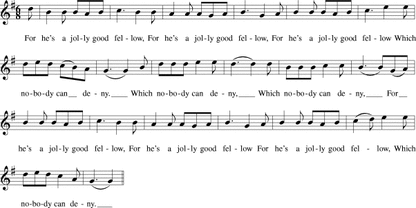For he's a jolly good fellow
|
"For he's a jolly good fellow" is a song that is used to congratulate a person on a significant event, as there are a birthday, a wedding, a promotion ... Any special event in a persons life can do, as a matter of fact. But nobody realizes that the tune goes back to France in the 18th century, only then it was called "Marlborough s'en va-t-en guerre" (Marlborough has left for war).
Allegedly "Marlborough s'en va-t-en guerre" was composed the night after the Battle of Palplaquet in 1709. The melody tells how Marlborough's wife, waiting his return from battle, is given the news of her husbands death. It became a French folk tune and was popularized by Marie Antoinette after she heard one of her maids singing it at the cradle of her son, Louis XVII. The name, the simplicity of the words and the melodiousness of the tune interested the queen, and she frequently sang it. Everybody |
repeated it after her, including the king. The song was sung in the apartments of Versailles, in the kitchens and in the stables, it became immensely popular.
From the court it was addopted by the tradespeople of Paris and it passed from town to town, from country to country. It became as popular in England as in France. It is said that a French gentleman in London, wishing to be driven to Marlborough Street, but forgot its name, was driven to the proper address by the coachman, only on humming the tune. And Johann von Goethe, who was travelling in France during the same period, was so annoyed with the universal concert that he hated Duke Marlborough for it, though he was only the innocent cause of the musical epidemic.
From the court it was addopted by the tradespeople of Paris and it passed from town to town, from country to country. It became as popular in England as in France. It is said that a French gentleman in London, wishing to be driven to Marlborough Street, but forgot its name, was driven to the proper address by the coachman, only on humming the tune. And Johann von Goethe, who was travelling in France during the same period, was so annoyed with the universal concert that he hated Duke Marlborough for it, though he was only the innocent cause of the musical epidemic.
|
The tune became also popular in Spain due to the Bourbon dynasty's influence on Spanish nobility. The name Marlborough was modified to an easier to pronounce Manbrú. Then the song spread to Latin America. The popularity of the song was such that it gave its name to fashions, to head-dresses, to silks, etc. The subject of the song was printed on fire screens, on fans, and on porcelain ... The rage endured for many years, slowly fading after the French Revolution.
Ludwig van Beethoven used the tune in his musical work "Wellington's Victory", which features real canon shots. The song is refered to in Fyodor Dostoyevski's novel "Crime and Punishment", where Katerina Ivanovna Marmeladova tries to make her children sing the Russian version in public. The song is also refered to in Tolstoj's novel "War and peace". |
From the mid-19th century the melody was sung with the words "For he's a joly good fellow". By 1862 it was already familiar in America. There is a difference between Brittish and American versions: Brittish version says "For he's a joly good fellow, and so say all of us". American version goes: "For he's a joly good fellow, which nobody can deny." Yet the American version was also used in Charles Dickens work "Houshold words".
The American poet Henry Wadsworth Longfellow wrote the English version to the original lyrics Marlbrough s'en va-t-en guerre.
The Swedish version, Mellbom, is in cerain academic circumstances, Ostgota Nation mainly, traditionally combined with a humoristic pantomime describing the plot. Traditionally the fourth officer in the funeral parade, the one who was "left nothing to carry", performs in the nude. The Mellbom pantomime was invented by Mans Hultin in 1856. Due to the large number of female students, the Mellbom shows have grown rare in the last twenty years.
The American poet Henry Wadsworth Longfellow wrote the English version to the original lyrics Marlbrough s'en va-t-en guerre.
The Swedish version, Mellbom, is in cerain academic circumstances, Ostgota Nation mainly, traditionally combined with a humoristic pantomime describing the plot. Traditionally the fourth officer in the funeral parade, the one who was "left nothing to carry", performs in the nude. The Mellbom pantomime was invented by Mans Hultin in 1856. Due to the large number of female students, the Mellbom shows have grown rare in the last twenty years.
|
According to the Guinness book of Records "For he's a joly good fellow" is the second-most popular tune in English language. It is often sung instead of "Happy birthday", to avoid possible copyright issues.
Sources: http://en.wikipedia.org/wiki/For_He's_a_Jolly_Good_Fellow http://en.wikipedia.org/wiki/Marlbrough_s'en_va-t-en_guerre Click the link to hear "For he's a joly good fellow" on accordeon. Lyrics of the popular version: For he's a jolly good fellow, for he's a jolly good fellow For he's a jolly good fellow (pause), and so say all of us And so say all of us, and so say all of us For he's a jolly good fellow, for he's a jolly good fellow For he's a jolly good fellow (pause), and so say all of us! |
|
For he's a joly good fellow
Marlbrough s'en va-t-en guerre
|
Original French version
Marlbrough s'en va-t-en guerre, mironton, mironton, mirontaine, Marlbrough s'en va-t-en guerre, Ne sait quand reviendra. Il reviendra-z-à Pâques, mironton, mironton, mirontaine, Il reviendra-z-à Pâques, ou à la Trinité. La Trinité se passe, mironton, mironton, mirontaine, la Trinité se passe, Marlbrough ne revient pas. Madame à sa tour monte, mironton, mironton, mirontaine, Madame à sa tour monte si haut qu'elle peut monter. Elle voit venir son page, mironton, mironton, mirontaine, elle voit venir son page, tout de noir habillé. Beau page, mon beau page, mironton, mironton, mirontaine, beau page, mon beau page, quelles nouvelles apportez? Aux nouvelles que j'apporte, mironton, mironton, mirontaine, aux nouvelles que j'apporte, vos beaux yeux vont pleurer! Quittez vos habits roses, mironton, mironton, mirontaine, quittez vos habits roses, et vos satins brodés! Monsieur Marlbrough est mort. mironton, mironton, mirontaine, Monsieur Marlbrough est mort. Est mort et enterré. Je l'ai vu porter en terre, mironton, mironton, mirontaine, Je l'ai vu porter en terre, par quatre-z-officiers. L'un portait sa cuirasse mironton, mironton, mirontaine, l'un portait sa cuirasse l'autre son bouclier. L'autre portait son grand sabre, mironton, mironton, mirontaine, L'autre portait son grand sabre, et l'autre ne portait rien. On planta sur sa tombe mironton, mironton, mirontaine, on planta sur sa tombe un beau rosier fleuri. La cérémonie faite, mironton, mironton, mirontaine, la cérémonie faite chacun s'en fut coucher... |
English version
Marlbrook the Prince of Commanders Is gone to war in Flanders, His fame is like Alexander's, But when will he ever come home? Mironton, mironton, mirontaine. Perhaps at Trinity Feast, or Perhaps he may come at Easter, Egad! he had better make haste or We fear he may never come home. Mironton etc. For Trinity Feast is over, And has brought no news from Dover, And Easter is pass'd moreover, And Malbrook still delays. Milady in her watch-tower Spends many a pensive hour, Not knowing why or how her Dear lord from England stays. While sitting quite forlorn in That tower, she spies returning A page clad in deep mourning, With fainting steps and slow. "O page, prithee come faster! What news do you bring of your master? I fear there is some disaster, Your looks are so full of woe." "The news I bring fair lady," With sorrowful accent said he, "Is one you are not ready So soon, alas! to hear. "But since to speak I'm hurried," Added this page, quite flurried, "Malbrook is dead and buried!" And here he shed a tear. "He's dead! He's dead as a herring! For I beheld his berring, And four officers transferring His corpse away from the field. "One officer carried his sabre, And he carried it not without labour, Much envying his next neighbour, Who only bore a shield. "The third was helmet bearer - That helmet which in its wearer Fill'd all who saw it with terror, And cover'd a hero's brains. "Now, having got so far, I Find that – by the Lord Harry!- The fourth is left nothing to carry.- So there the thing remains." Mironton, mironton, mirontaine. |
Spanish version
Mambrú se fue a la guerra, ¡qué dolor, qué dolor, qué pena!, Mambrú se fue a la guerra, no sé cuándo vendrá. Do-re-mi, do-re-fa, no sé cuándo vendrá. Si vendrá por la Pascua, ¡qué dolor, qué dolor, qué gracia!, si vendrá por la Pascua, o por la Trinidad. Do-re-mi, do-re-fa, o por la Trinidad. La Trinidad se pasa, ¡qué dolor, qué dolor, qué guasa!, la Trinidad se pasa Mambrú no viene ya. Do-re-mi, do-re-fa, Mambrú no viene ya. Por allí viene un paje, ¡qué dolor, qué dolor, qué traje!, por allí viene un paje, ¿qué noticias traerá? Do-re-mi, do-re-fa, ¿qué noticias traerá? Las noticias que traigo, ¡del dolor, del dolor me caigo! las noticias que traigo son tristes de contar, Do-re-mi, do-re-fa, son tristes de contar. Que Mambrú ya se ha muerto, ¡qué dolor, qué dolor, qué entuerto!, que Mambrú ya se ha muerto, lo llevan a enterrar. Do-re-mi, do-re-fa, lo llevan a enterrar. En caja de terciopelo, ¡qué dolor, qué dolor, qué duelo!, en caja de terciopelo, y tapa de cristal. Do-re-mi, do-re-fa, y tapa de cristal. Y detrás de la tumba, ¡qué dolor, qué dolor, qué turba!, y detrás de la tumba, tres pajaritos van. Do-re-mi, do-re-fa, tres pajaritos van. Cantando el pío-pío, ¡qué dolor, qué dolor, qué trío!, cantando el pío-pío, cantando el pío-pa. Do-re-mi, do-re-fa, cantando el pío-pa. |
German verson
Marlbrough zieht aus zum Kriege, Die Fahne läßt er wehn; Da reicht zum Kampf und Siege Die Hand ihm Prinz Eugen. Sie mustern ihre Truppen Bei Höchstädt auf dem Plan: "Gut stehn im Brett die Puppen, Frisch auf, wir greifen an." Und wie sie mit dem Haufen Dem Feind entgegen ziehn, Da kommt gejagt mit Schnaufen Ein Hofkurier aus Wien. Er springt in buntem Staate Vom Roß und neigt sich tief: "Vom hohen Kriegshofrate, Durchlaucht'ger, hier ein Brief!" Der kleine Kapuziner Schiebt in die Brust ihn sacht: "Der Herrn ergebner Diener, Das les' ich nach der Schlacht. Jetzt ist kein Zaudern nütze, Jetzt heißt es dran und drauf! Schon spielen die Geschütze Tallards zum Kampf uns auf. Er wirft sich auf die Franzen, Marlbrough bleibt nicht zurück; Bei Höchstädt an den Schanzen Das ward ihr Meisterstück. Wohl krachts von Wall und Turme, Wohl sinken Roß und Mann, Doch vorwärts geht's im Sturme, Die Feldherrn hoch voran. Im dichten Kugelregen, Den Degen in der Hand, Erklimmen sie verwegen Des Lagers steilen Rand. Da packt den Feind ein Grausen, Da weicht er fern und nah, Und hinter ihm mit Brausen Ertönt's: "Viktoria!" Und wie des Kaisers Reiter Nachrasseln Stoß auf Stoß, Da frommt kein Haltruf weiter, Geworfen ist das Los. Ersiegte Fahnen prangen Zweihundert an der Zahl, Man bringt daher gefangen, Tallard, den General. Doch abends als die Flaschen, Im Kreis ums Feuer gehn, Da zieht aus seiner Taschen Sein Brieflein Prinz Eugen. Studiert's und reicht's dem Briten, Der blickt hinein und lacht: "Parbleu! die Herrn verbitten In Wien sich jede Schlacht. Nur kurze Retirade Sauvier'uns meint der Wisch: Erlesner Senf! Nur schade, Für diesmal Senf nach Tisch!" |


